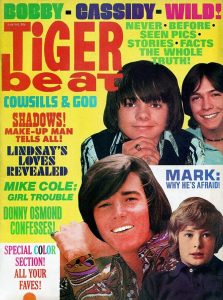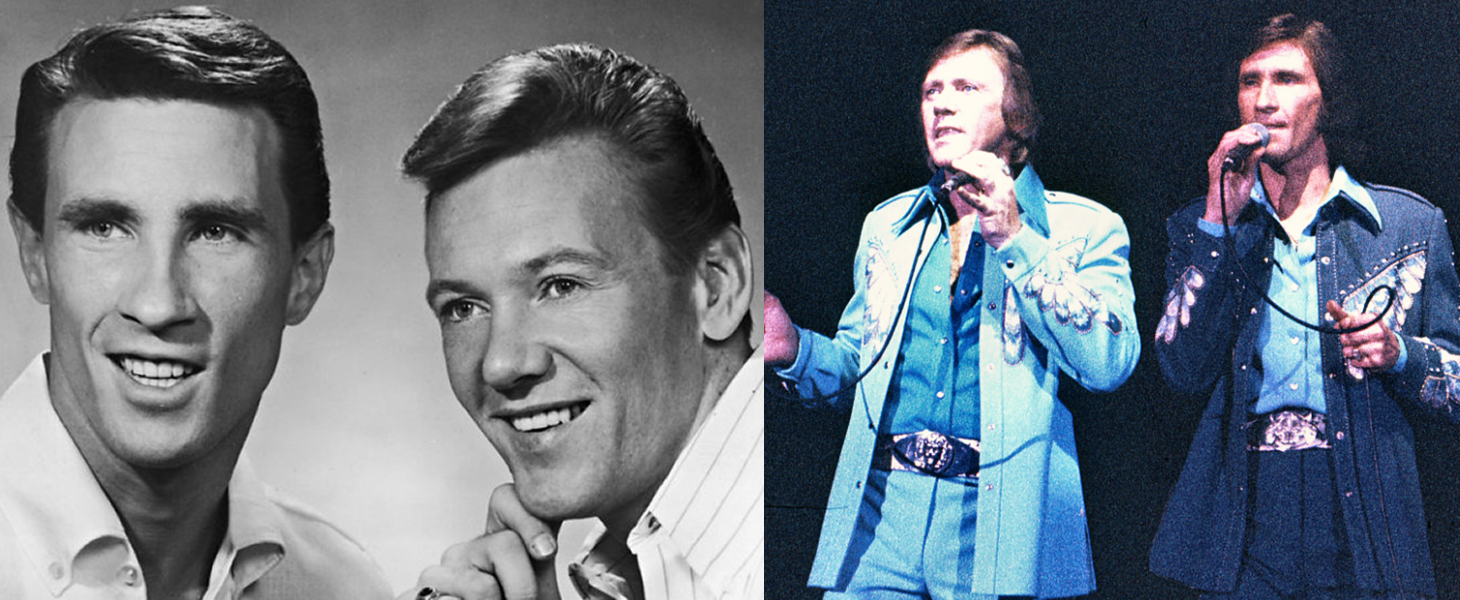This post is about a song by The Righteous Brothers. I don’t know if they really were righteous, but I do know they weren’t brothers, so I guess I report, you decide. If you’re the churlish tl;dr type who can’t wait till the end of this post to hear the song, it’s down at the bottom, but if you skip the whole post like that you can’t be my friend or come up in my tree fort anymore.
If you’re under 45, chances are the only time you’ve been exposed to the Righteous Brothers was in the movie Ghost, or possibly in Top Gun.
In Ghost, The Righteous Brothers’ “Unchained Melody” plays while Demi Moore is sculpting a vozz, and Patrick Swayze sits down behind her and the vozz gets ruined and they get slimy wet clay all over themselves.
In Top Gun, The Righteous Brothers’ “You’ve Lost That Lovin’ Feeling” plays on a jukebox once or twice, along with the fighter pilots singing “Great Balls of Fire” and Kenny Loggins singing “Danger Zone” and the pilots playing half-naked volleyball and flying around really fast and in general sloshing buckets of sweat and testosterone off the screen and all over the audience.
The Righteous Brothers were were a hugely successful white crooner/extremely white doo-wop duet in the late ‘50s and early ‘60s. And since this post is about The Righteous Brothers, I’d like to talk about The Partridge Family.
The Partridge Family was a TV show about a fictional musical family loosely based on the real musical family The Cowsills, who not only had a hit with the song “Hair,” from the musical with the same name, but also got me very confused when was a kid, because it seemed to me that if a cow has sills, it should also have windows.
 So anyway, The Partridge Family was neither a family nor a band. It was a TV show with a bunch of actors pretending to be a band that didn’t exist, except they did kind of exist because you could go to Woolco or Sears and buy 45 RPM singles labeled The Partridge Family, even though the songs were performed by David Cassidy with a band of generic musicians, which conspicuously lacked a 10-year-old bassist and a 7‑year-old drummer.
So anyway, The Partridge Family was neither a family nor a band. It was a TV show with a bunch of actors pretending to be a band that didn’t exist, except they did kind of exist because you could go to Woolco or Sears and buy 45 RPM singles labeled The Partridge Family, even though the songs were performed by David Cassidy with a band of generic musicians, which conspicuously lacked a 10-year-old bassist and a 7‑year-old drummer.
My dad hated The Partridge Family. He also hated The Jackson 5, The Osmond Brothers, The Carpenters, the Monkees, The Righteous Brothers, and Bobby Sherman (who, on a side note, originally leased the custom-built 747 that Led Zeppelin used and was seen in the 1976 film The Song Remains the Same, which was about a Led Zeppelin concert in New York City in 1973).
Dad did not hate any of these musicians for their music. As far as he was concerned, they were just noise. Dad was like Bob’s wife, who worked at Bob’s Country Bunker in The Blues Brothers and who, when asked about what kind of music she liked, replied, “Both kinds: country AND western!”
What Dad hated was their faces. He also hated 3M, the company that produced Scotch Tape, and the magazine Tiger Beat.

Tiger Beat profiled young musicians and actors as long as they were safe-looking relatively short-haired guys (which is why Led Zeppelin and Alice Cooper and The Doors never appeared therein).
Scotch Tape sold the tape my sisters used when they scissored Tiger Beat into confetti once a month in order to tape headshots of that month’s dreamiest teen idols all over their bedroom doors, then rip them all off to tape up the head shots from the next month’s issue, which was rapidly stripping the finish off the doors.
After school one day my mom asked me to go fetch her cigarettes from her room. The cigarettes were on her nightstand; as I picked them up I glanced at a 45 RPM single next to the cigarettes. It was a single by The Partridge Family titled “One Night Stand.”
I was 9 and not too sharp on the subtler nuances of grammar and spelling, so when I saw the single “One Night Stand” on the nightstand, my first thought was Why would anyone sing a song about a piece of furniture? 1
So I grabbed the single, along with the cigarettes, and asked Mom why The Partridge Family had a song about a nightstand, which led to an awkward, unsatisfying explanation about how a one night stand was when two people went to go see a movie together, but then decided not to see any more movies together.
I never did find out why the single was on Mom’s night stand.
Fast forward two years to the summer of ’74. I was 11 and had vaguely figured out that a one night stand was a very brief romance, and the reason the guy and the girl didn’t want to see any more movies together was because they didn’t like kissing. Prepubescent me understood that, because girls were yucky and kissing was stupid.
We were vacationing in Galveston, Texas, that summer. The Righteous Brothers had just released a song titled “Rock and Roll Heaven,” and it was getting heavy airplay, at least once an hour all the way there, all day every day we were there, and all the way back.
If you’ve never heard “Rock and Roll Heaven,” it’s a tribute to the legacy of musicians who had passed on, including Jimi Hendrix, Janis Joplin, Jim Morrison, Jim Croce, Bobby Darin, and Otis Redding.
I didn’t get most of the references other than Jim Croce and Janis Joplin; “Bad Bad Leroy Brown” had been a big hit the previous year. Joplin had appeared on the Tom Jones variety show, which my mom loved (and I snicker a little bit now, but at least she didn’t throw panties at the TV).2
I also recognized the reference to “Light My Fire,” but I’d seen Anthony Newley singing it on a variety show and I thought it was his song.
I loved “Rock and Roll Heaven” on its own merits; still do. But what made it so cool at the time was the chorus:
If you believe in forever
Then life is just a one night stand.
If there’s a rock and roll heaven
Well you know they got a hell of a band!
Part of it was the puerile thrill of someone on the radio singing the word “hell,” which was still mildly naughty, but what made the biggest impression was that for the first time I can remember, I connected with lyrics that used a simile to touch on a much deeper truth: Compared to eternity, life is short. Blink-and-you’ll-miss-it short. And maybe someday those who touched our lives but have since passed on—well, maybe someday we’ll see them again. And in the meantime we can remember them by celebrating their lives and legacies.
MTV didn’t exist in 1974, but thanks to Midnight Special and American Bandstand, you could occasionally see a music video or live performance of hit songs.3
I didn’t know “Rock and Roll Heaven” had a music video until the other day, when I stumbled across it on YouTube. And just like that, a song I hadn’t thought of for more than 40 years was back, with all the influence and emotion it generated back then.
So I now present to you, all the way back from 1974, The Righteous Brothers’ “Rock and Roll Heaven.”
Time travel can be brutal, though: In this case, try not to think about how unbuttoned shirts and bell-bottomed leisure suits and lapels wider than your shoulders were once unbearably cool.
During our ’74 summer vacation, Dad found “Rock and Roll Heaven” annoying, even though The Righteous Brothers weren’t Tiger Beat material, and he kept tuning to something else when it came on. I would yell, “Turn it back on! I love that song!” from the back seat.
Made him grouchy but it was worth it.
- You’re thinking Aha! He should have remembered “I Am I Said”, aren’t you? Oh, but I did. “I Am I Said” isn’t about the chair; he sang part of it to the chair. Neener neener.
- As far as I know, at least.
- I refer, of course, to that six-month period in 1981 during which MTV aired music videos. Nowadays it’s YouTube.
